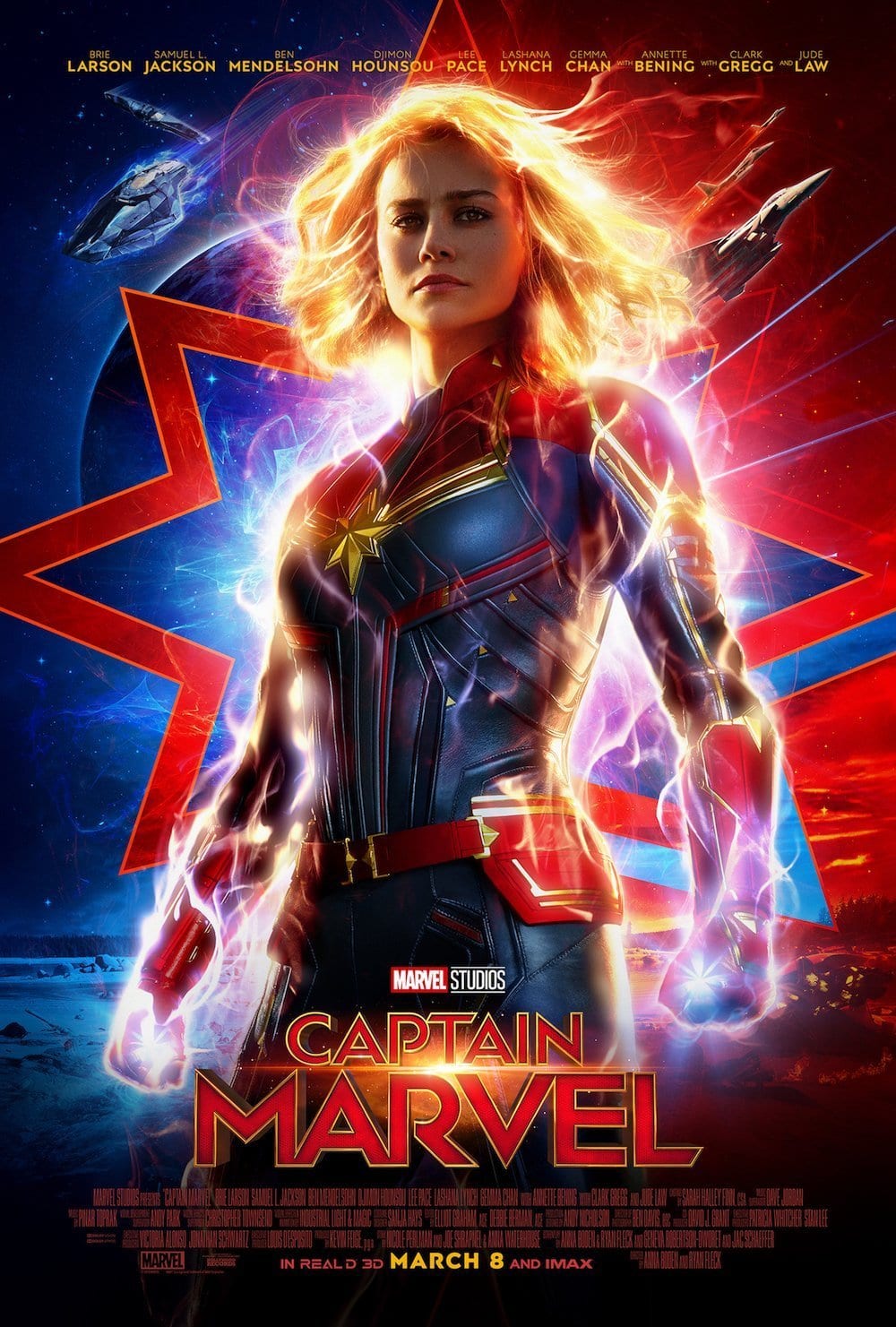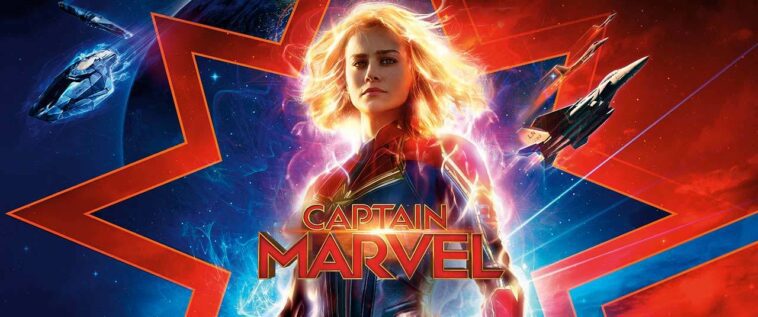Welcome to What’s the Buzz, where members of our staff provide you with recommendations on a weekly basis. This week’s entries come from: Will Johnson, Carol Seeds, John Bernardy, and Sean Mekinda.
Will: Most of the staff knows I love me some damn fine Marvel films, most especially the MCU (the Marvel Cinematic Universe, for those who have lived under a rock the last eleven years). They also know that I ask about every five days to add MCU content to the website so they graciously allowed me to write this…because it is timely (and probably has nothing to do with the fact that I endlessly harass them about it).
But this week I got my way and my recommendation for the week is the just released Captain Marvel, the 21st film in the MCU saga. I am so glad the film is actually really good because I stated this would be this week’s recommendation despite the fact that when I said that earlier this week, I hadn’t seen the film yet! Luckily, I got to see it a little early before release and can confidently give it some positive “buzz.”
The MCU has been around long enough now that it has built its own formula. And if a good formula works, why change it? However, with recent releases like Black Panther and Thor Ragnarok pushing that formula to the limit (if not destroying it completely), and with established characters entering their second, third, or fourth films, the more “traditional” Captain Marvel may set you back for a bit.
Because Captain Marvel is an origin story and those have long been thought dead in the current Marvel universe. The film feels like it could easily fit into Phase 1 of the MCU, then the tail end of the current Phase 3. That is a compliment in many ways as it shows the universe is so seamless now that if placed in chronological order, regardless of when it was filmed, it would all flow as one piece.
And, without spoiling anything, it is a more traditional origin story in the vein of the comic book characters of Spider-Man, the Hulk, or Daredevil than the more deliberate and somewhat logical ways in which our current roster of Avengers got their powers. There is certainly something to say about fate and happy accidents in Captain Marvel and that works in the film’s favor, for the most part.
In brief, Vers (Brie Larson) is a Kree warrior with large gaps in her memory. She fights for an elite Kree military unit and is leading a mission against the Kree’s deadly enemies, the shape-shifting Skrulls, when she is captured and mentally probed, bringing into light some vague memories of another life. During her escape from the Skrulls, Vers crashes on Earth circa 1995, where some of her lost memories appeared to have come from. Of course, her search is interrupted by her Kree colleagues trying to find her, a menacing group of Skrulls on her tail, and a feisty young Nick Fury of S.H.I.E.L.D. trying to figure her all out.
The true highlight of the film is clearly the cast. Samuel L Jackson feels vital again and seems to be having the time of his life playing a young Fury with two whole eyes. And his chemistry with our hero, Brie Larson, is superb. Larson herself plays the character of Vers in a very wry and almost purposefully stilted way. It isn’t a stiltedness from bad acting, but a character choice: she always looks like she is in on a secret joke and/or that she is better than everyone she is looking at at the time and we are all about to find out. It is a kind of pseudo-stoicism that makes her engaging and kind of mysterious.
Other casting descriptions might give too much away, but I will say that Ben Mendelsohn makes for a surprisingly effective Skrull (I like the Skrulls but feared they’d be another Dark Elves from the mostly dreary Thor: The Dark World), while Lashana Lynch, as a strong connection to Vers past, is fantastic.
Despite my immense MCU bias, I won’t say Captain Marvel is without flaws. It certainly plays with great ideas but sometimes fails to execute them. And when I say it relies on a Marvel formula, that does have its drawbacks, as early MCU films, especially the origin ones, had some flimsy storytelling. Captain Marvel does take some leaps to from Point A to Point C of character development, kind of forgetting Point B is where you can make that jump a bit smoother. Plus, the first twenty minutes is surprisingly slow moving. While that may end up fitting the character development of Vers herself, it kind of grinds down the momentum and the ability to set a tone.
That said, while the entire film tends to lean more on formula rather than innovation, there are a number of nice twists, some very telegraphed and assumed but others quite surprising. Either way, expected or not, they are fun, as most Marvel films are. Like I said: if it ain’t broke, why fix it? And while it might not make you roll in the aisles, the humor is pretty sharp, and the entire ‘90s nostalgia theme is not as played up as the trailers make it out to be.
I could go on and on about the powerful themes of female empowerment, the somewhat subtle commentary on the current immigration situation in the US, and how Captain Marvel herself fits into the whole MCU itself but the editors at 25YL have already let this inmate run the asylum for oh so brief a time. Just go see the film. My theater gave a standing ovation and the little girls in attendance were psyched to see someone like Brie Larson having her way with a bunch of chumps!
And for those who want to know: Stan Lee made it into the picture. A few times. Maybe a few twenty-five times or so. Just sayin’, keep your eyes open. ‘Nuff said!

Carol: Bring Me the Horizon lead vocalist, Oliver Sykes, told Loudwire in a 2018 interview that the band was “fine with going mainstream.” With their newly released studio album Amo, I do believe we can say that was the understatement of the year. Many fans of the former screamo group have expressed many different emotions, from euphoria to dismay. The best I can say is that Oli warned us from the beginning that things were going to be changing for the group. We definitely can’t say that this took us by surprise. After That’s the Spirit, we definitely saw that the group was beginning to move away from their metal roots. Anyone who has ever listened to BMTH tends to agree that Sempiternal was the final metal album for them, and we most likely won’t see them go back to it.
First, a teaser for the first single “Mantra” made its way onto social media and everyone started to get really excited, myself included. I must say, I really enjoyed “Mantra.” It even reminded me of the progressively positive changes that I had seen on the last two albums. The chorus is extremely catchy and Sykes gets in everyone’s mind with his slogan, “Do you want to start a cult with me?” A couple weeks later, “What a Wonderful Life,” featuring lead vocalist Dani Filth from Cradle of Filth. popped up on YouTube with no warning. This song was just too much fun, despite the depressing “this is all there is to life” lyrics that we have come to expect from Sykes. Both of these songs were tuned low and heavy and sound amazing.
I do believe these first two singles were meant to whet the appetite of the old fans. There were no plans to continue though and “Mother Tongue” and “Medicine” displayed BMTH’s bold move towards mainstream outlets with electronica and pop. Headlines from every metal or rock affiliated media screamed ”Bring Me the Horizon go full pop!” They weren’t lying.
There was a ton of backlash before the album was even fully released, so BMTH answered with “Heavy Metal”, calling out fans and saying “No, this isn’t heavy metal and what you think really doesn’t matter.” While I personally find Amo to be a little disappointing, because I do miss the thrashy, metalcore guitars, I don’t doubt that BMTH know what they are doing and the other band members really do seem to enjoy following the lead of their frontman. “Mantra” received a nomination for Best Rock Song at this year’s Grammys and they are no stranger to awards. So, good luck to the guys of Bring Me the Horizon. I don’t think I will purchase this album, but Sempiternal will always be dear to me.
Sean : For years, The Office has been the world’s go to for workplace humor, personifying the absurdity of life in a 9-to-5 job in light-hearted ways amidst a cast of friendly and wacky characters. Turn that coin over, however, and you’ll see Corporate, a bleak gray nightmare of a world, populated by the weary soulless office workers of a large corporation as they struggle with their own dreams and the nihilism that has come to define much of the millennial generation.
It’s hilarious and one of the best shows on television.
The show hits on a lot of the standard tropes common to the “workplace comedy” genre of television, channeling a lot of the ethos of Office Space and its ilk, while taking the grim outlook of these shows and movies and stripping away the happy ending. Corporate often opts for a more grounded conclusion, one of acceptance that life is pain and the corporate existence doesn’t care to ease that pain (I stress again, the show is very funny). Each episode plays the banality of small office moments to the extreme, taking the minutia to the absurd. Simple things like getting a bagel before a meeting become the most important element of the episode, and basking in the tribulations of the pointless is truly where Corporate shines.
Corporate is the living embodiment of “it’s funny because it’s true, but also hurts.” Each episode treats itself as an absurdist look at life within the monochrome office walls, but somehow ends up feeling far more grounded than even the most true-to-life episode of The Office. It’s an unrelentingly dark show, but one that, as a millennial office worker, it’s hard not to see myself in week after week, laughing outwardly, but sobbing inwardly.
Seriously, I promise it is very funny.
John: Over the weekend I was listening to the podcast version of the classic NPR interview show Fresh Air and they re-ran a portion of a 1996 interview between host Terry Gross and classic director Stanley Donen. There were so many stories of old school Hollywood touched on in this 20-minute segment I just needed to recommend it.
Donen explained how the dance numbers of Singin’ in the Rain were choreographed and how they actually had to dig chunks out of the set for proper puddle placements, and I was dazzled by hearing Audrey Hepburn was star-struck mortified nervous about meeting Fred Astaire for the first time before they starred in Funny Face together. You don’t usually get first-hand stories from a guy this high up the ladder, so go get it!
I’ve been listening faithfully to Fresh Air since 2013 when I discovered podcasts. It may be one of those known commodities like This American Life, and Terry Gross may be one of the best interviewers of the past two decades, but there are reasons for this. And this one made my heart so happy I needed to recommend it to you too.
Let us know what you’d recommend to us! You never know, we might check it out and write something!


